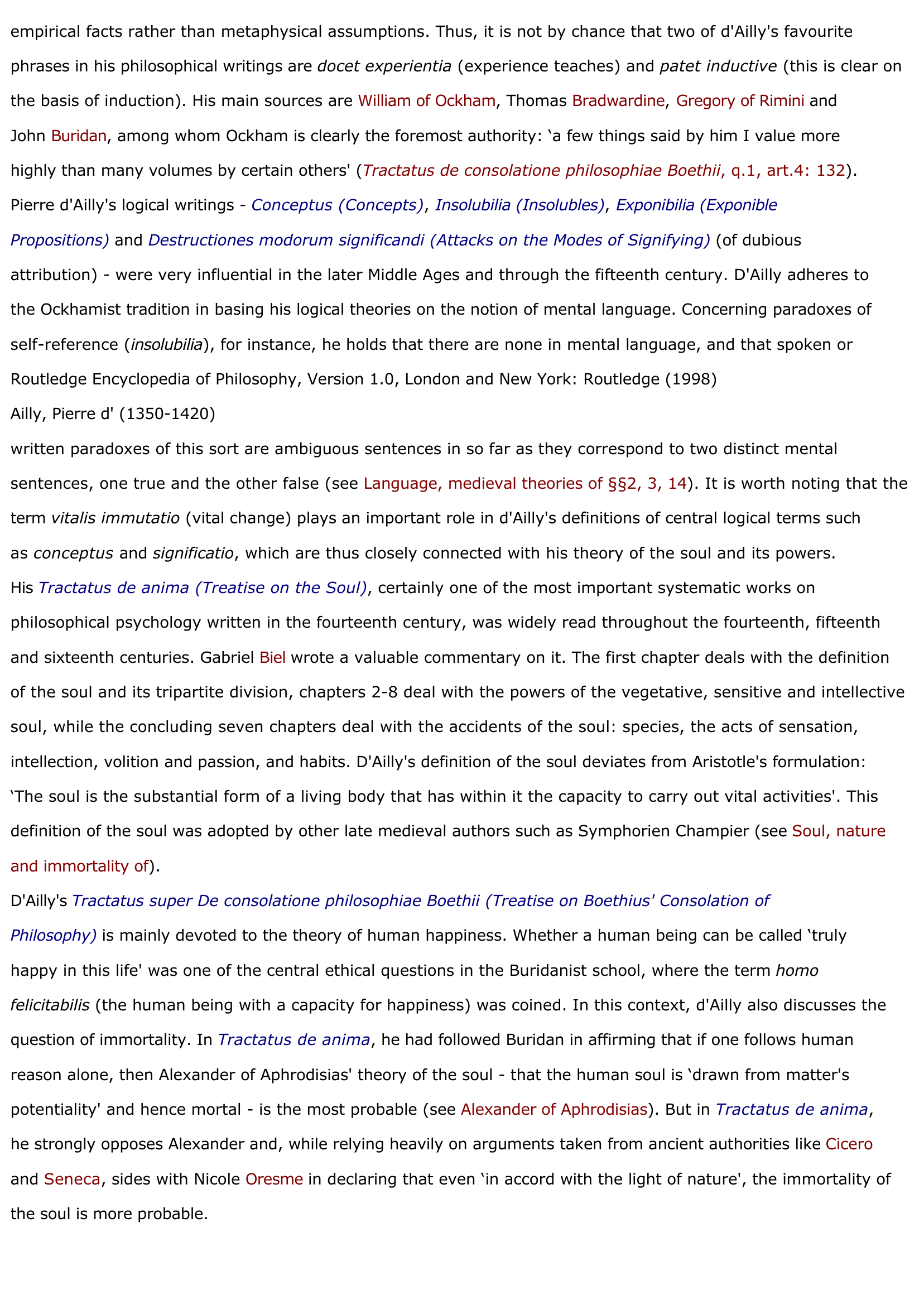Encyclopedia of Philosophy: Ailly, Pierre d'
Publié le 11/01/2010
Extrait du document
D’Ailly’s Tractatus super De consolatione philosophiae Boethii (Treatise on Boethius’ Consolation of
Philosophy) is mainly devoted to the theory of human happiness. Whether a human being can be called ‘truly
happy in this life’ was one of the central ethical questions in the Buridanist school, where the term homo
felicitabilis (the human being with a capacity for happiness) was coined. In this context, d’Ailly also discusses the
question of immortality. In Tractatus de anima, he had followed Buridan in affirming that if one follows human
reason alone, then Alexander of Aphrodisias’ theory of the soul - that the human soul is ‘drawn from matter’s
potentiality’ and hence mortal - is the most probable (see Alexander of Aphrodisias). But in Tractatus de anima,
he strongly opposes Alexander and, while relying heavily on arguments taken from ancient authorities like Cicero
and Seneca, sides with Nicole Oresme in declaring that even ‘in accord with the light of nature’, the immortality of
the soul is more probable.
«
empirical facts rather than metaphysical assumptions.
Thus, it is not by chance that two of d'Ailly's favourite
phrases in his philosophical writings are docet experientia (experience teaches) and patet inductive (this is clear on
the basis of induction).
His main sources are William of Ockham , Thomas Bradwardine , Gregory of Rimini and
John Buridan , among whom Ockham is clearly the foremost authority: ‘a few things said by him I value more
highly than many volumes by certain others' ( Tractatus de consolatione philosophiae Boethii , q.1, art.4: 132 ).
Pierre d'Ailly's logical writings - Conceptus (Concepts) , Insolubilia (Insolubles) , Exponibilia (Exponible
Propositions) and Destructiones modorum significandi (Attacks on the Modes of Signifying) (of dubious
attribution) - were very influential in the later Middle Ages and through the fifteenth century.
D'Ailly adheres to
the Ockhamist tradition in basing his logical theories on the notion of mental language.
Concerning paradoxes of
self-reference ( insolubilia ), for instance, he holds that there are none in mental language, and that spoken or
Routledge Encyclopedia of Philosophy, Version 1.0, London and New York: Routledge (1998)
Ailly, Pierre d' (1350-1420)
written paradoxes of this sort are ambiguous sentences in so far as they correspond to two distinct mental
sentences, one true and the other false (see Language, medieval theories of §§2, 3, 14 ).
It is worth noting that the
term vitalis immutatio (vital change) plays an important role in d'Ailly's definitions of central logical terms such
as conceptus and significatio , which are thus closely connected with his theory of the soul and its powers.
His Tractatus de anima (Treatise on the Soul) , certainly one of the most important systematic works on
philosophical psychology written in the fourteenth century, was widely read throughout the fourteenth, fifteenth
and sixteenth centuries.
Gabriel Biel wrote a valuable commentary on it.
The first chapter deals with the definition
of the soul and its tripartite division, chapters 2-8 deal with the powers of the vegetative, sensitive and intellective
soul, while the concluding seven chapters deal with the accidents of the soul: species, the acts of sensation,
intellection, volition and passion, and habits.
D'Ailly's definition of the soul deviates from Aristotle's formulation:
‘The soul is the substantial form of a living body that has within it the capacity to carry out vital activities'.
This
definition of the soul was adopted by other late medieval authors such as Symphorien Champier (see Soul, nature
and immortality of ).
D'Ailly's Tractatus super De consolatione philosophiae Boethii (Treatise on Boethius' Consolation of
Philosophy) is mainly devoted to the theory of human happiness.
Whether a human being can be called ‘truly
happy in this life' was one of the central ethical questions in the Buridanist school, where the term homo
felicitabilis (the human being with a capacity for happiness) was coined.
In this context, d'Ailly also discusses the
question of immortality.
In Tractatus de anima , he had followed Buridan in affirming that if one follows human
reason alone, then Alexander of Aphrodisias' theory of the soul - that the human soul is ‘drawn from matter's
potentiality' and hence mortal - is the most probable (see Alexander of Aphrodisias ).
But in Tractatus de anima ,
he strongly opposes Alexander and, while relying heavily on arguments taken from ancient authorities like Cicero
and Seneca , sides with Nicole Oresme in declaring that even ‘in accord with the light of nature', the immortality of
the soul is more probable..
»
↓↓↓ APERÇU DU DOCUMENT ↓↓↓
Liens utiles
- Abélard, Pierre Adam de La Halle Ader, Clément Ailly, Pierre d' Aliénor d'Aquitaine Ampère, André
- Abélard, Pierre Ailly, Pierre d' Arnauld, Angélique Bernard de Clairvaux Calvin Fénelon Fleury, cardinal de François de
- D'Ailly, Pierre - religieux.
- Encyclopedia of Philosophy: al-Ghazali, Abu Hamid
- Encyclopedia of Philosophy: al-Farabi, Abu Nasr


